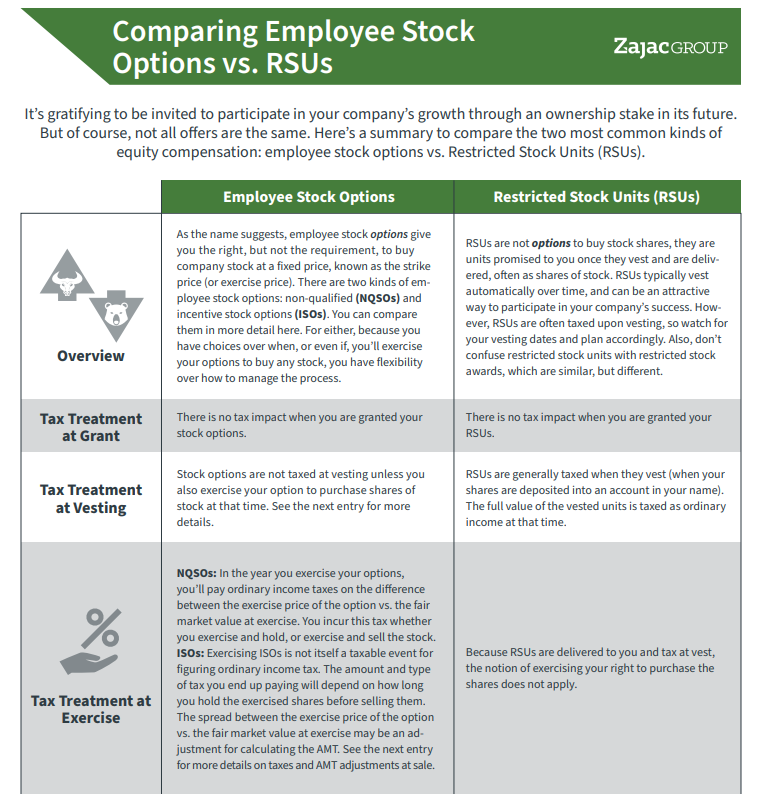If you done any research on equity compensation and employee stock options, you’ve likely come across terms and phrases like “concentration risk” and “too many eggs in one basket.”
You may have also read up on stories that detail how a declining stock price wiped out someone’s net worth before they could exercise, sell, and realize the value that used to be in their employee stock options.
As a result, you might feel wary about your own employee stock options — especially if you’re more conservative with your investments.
That’s understandable, because having employee stock options may come with a unique set of risks that need to be managed. Particularly, single stock risk, and the risk that the value of your employee stock options may fluctuate meaningfully.
Assuming single stock risk is real, it leads to a question – does it make sense to retain employee stock options and other equity compensation if you are a conservative investor? And if so, how does someone go about managing equity compensation and employee stock options in a way that aligns with their conservative nature?
Let’s take a look at 6 steps conservative investors might want to take when it comes to managing their employee stock options.
COMPARISON GUIDE
Not All Stock Offers are the Same! Here's a helpful comparison between two of the most common employee stock options.
1 – Know What Type of Equity Compensation and Employee Stock Options You Have
When it comes to equity compensation, it’s not one size fits all.
Equity compensation comes in many forms. Various types of equity brings its own rules regarding when you can access the value and/or shares, when you pay income tax, how they are taxed, and what, if anything, you can do to control the timing of these events.
Here are some common types of equity comp that might be sitting in your portfolio right now:
- Stock purchased on the open market – Company stock you own outright, usually purchased on the open market
- Employee Stock Purchase Plan (ESPP) – Stock acquired through an employer-offered option to buy shares, often through a payroll deduction, often at a discounted price.
- Restricted Stock Units (RSUs) – Shares of stock (or the value paid in cash, please see your plan document) that you acquire based on rules set by your employer, often the passage of time period. Commonly referred to as a vesting schedule.
- Non-Qualified Stock Options – Employee stock options provide you with the option to buy company stock at an exercise price set by the employer. Prior to exercise you do not own the stock, only the right (or option) to buy it. Post-exercise, you own the shares. The option is typically offered for a set period of time, often 10 years.
- Incentive Stock Options – Similar to non-qualified stock options, but more complex from a tax standpoint. However, you may be able to obtain preferential tax treatment on the sale of your stock if you meet certain rules.
- Stock in a 401(k) plan – it is possible to on company stock in a 401(k) plan, something that should be considered as part of the overall percentage in one company stock
One interesting note about the various types of equity compensation is that in some cases you own the stock and in others you own the right to buy the stock. Both types, however, are impacted by a movement in the stock price.
If you are conservative, a good first step is to evaluate what you have access to and what you may already own. Once you know what you own, you can begin to develop a plan to retain, manage, or eliminate your risk.
2 – Know When You Can Do What with Your Employee Stock And Equity Compensation
Once you know what you have, you need to know what you can do with it — and when.
Long stock, or stock that you probably purchased on the open market, is usually freely transferable at any time. If it is, you may be able to immediately sell the shares and transition the proceeds elsewhere.
For a conservative investor who is looking to remove risk, this is an easy option (keep in mind, however, that selling stock is a taxable event. And you might want to consider how you will be impacted by a sale).
If you don’t have long stock, things may get more complicated as you’re likely more limited on when you can sell. RSUs, for example, are typically issued with a vesting schedule. Until the units vest (and assuming you receive shares, not the equivalent cash value), you cannot sell them.
In theory, you may have thousands (or hundreds of thousands) of dollars tied up those restricted stock units that you cannot do anything with.
Similarly, you have been participating in an ESPP plan that allows you to easily accumulate stock, potentially at a discount, via payroll deductions. Some ESPP plans however, may not allow you to sell those shares right away. To know for sure, you can check your plan document for more information around the rules and regulations of your specific ESPP.
Employee stock options may allow for the most planning opportunities, but you still may not be able to sell them. They often follow a vesting schedule like RSUs, but they differ in that you can control when you exercise the option to buy the shares and therefore when you are taxed.
This ability to control the exercise of employee stock options may lead to additional considerations for the conservative investor. In one sense, you didn’t pay anything for the option so you have little to lose should you do nothing. But by not exercising and selling your shares, you are putting whatever value the options currently have at risk — something a conservative investor may not be interested in doing.
3 – Consider Selling Your Restricted Stock Units (RSUs) ASAP
If you have restricted stock units, you might want to sell them immediately. As touched on above, your ability to sell your restricted stock units may or may not be totally in your control due to vesting schedules — but once you can sell, it might make sense for you to choose this option.
Remember, when your employer grants RSUs, they give you a promise of something in the future. You may be given 10,000 RSUs, for example, and those vest in 3 years. Between the time the RSUs are granted and the time they vest, you have no right to them nor are they taxed.
When you reach the 3-year time restriction, however, the RSUs vest and you take ownership of the shares (check your plan document to see if you will receive shares or cash when this happens).
You are also taxed on the value of the units that day. Specifically, you are taxed on the following:
Number of Units Vested * Share Price = Taxable Income
Typically, the amount of tax due is paid through a cashless exercise where some units are withheld to cover the tax liability and you receive the remainder (keep in mind however, that the amount withheld may or may not be enough to cover your actual tax bill, and you may want to consult with someone who can help).
Because you already paid tax on the shares of stock you receive and because shares are no longer subject to risk of loss, they very much resemble stock as if you went out and purchased it the same day. Following that logic, it makes sense that if you sell that same day, there is likely little taxable gain/loss that needs to be reported. It also makes sense for conservative investors who want to diversify that vested restricted stock units are an easy option.
4 – Consider Selling ESPP Shares ASAP, As Well
An employee stock purchase plan allows for a convenient way to purchase company stock through payroll deductions. Some companies even offer a discount of up to 15% of the stock price to participate in an ESPP.
Typically, participation in an ESPP means that you defer a set dollar (or percentage) per pay period into the plan. For a set period of time (often 6 months) the money is collected. At the end of the set period, your dollars are used to purchase shares of company stock on your behalf.
An ESPP can provide a convenient, profitable, and low-risk way to participate in the growth company stock. But as a conservative investor, you may want to consider liquidating your plan shares immediately after they are purchased for you. If you get to buy the stock at a discount, immediately selling may mean locking in a minimum profit equal to that discount.
Much like restricted stock units, ESPP shares resemble stock purchased outright once they are purchased through the plan. Therefore, as a conservative investor, it may make sense to sell them right away.
5 – Make a Plan for Employee Stock Options
Employee stock options may present the biggest planning challenge for conservative investors, and deserve a well-thought out strategy for properly managing them according to your goals and risk tolerance.
You may have considerable wealth tied up in your employee stock options, which is an opportunity — but mismanagement can cost you, and no matter what, you may need to pay taxes on any exercise and sale that you do.
Let’s assume that you were granted 10,000 options with an exercise price of $1 per share and a current share price of $50 per share, with a value of $490,000. There are a few things to note in this scenario:
- Until you exercise your shares, you likely don’t have to pay anything for them.
- If you do exercise your shares, you may need to pay tax. The type of tax depends on the type of employee stock options that you have.
- If you do not exercise, your $490,000 is subject to the fluctuations of the market and the prevailing share price. This may mean positive or negative swings in the value of the option
To overly simplify, if you are a conservative investor and seek to eliminate company stock risk, an exercise and sell at all tax cost may be the best strategy.
But if you are conservative and willing to assume some level of risk, you may be able to develop a strategy the manages your conservative investment nature with your goals of being tax smart and investment conscious. This means developing a strategy to exercise (or not) and sell (or not) your employee stock options.
6 – Determine How Much Money You Have Elsewhere
After all of this is said and done, none of it may even matter if you have only a small percentage of your overall net worth tied up in employer equity and employee stock options. One rule of thumb in the suggests no more than 10-15% of your net worth should be tied up in company stock.
If you fall below this percentage, even if you are a conservative investor, you might want to consider whether you are comfortable with that risk. And if so, does it make sense to keep your shares in company shares (while keeping an eye on your equity comp to be sure it remains an acceptable portion of your net worth).
For example, if your total net worth was $1,000,000 and you hold $100,000 worth of company equity, then only 10% of your wealth is tied up in your company. This may be an acceptable figure even for a conservative investor.
Be mindful, however, of how the other $900,000 of your wealth is invested. If all $900,000 is invested in a US equity fund, your overall allocation may be too aggressive considering your appetite for risk and willingness to expose yourself to volatility.
Putting the rest of your net worth into something like a more conservative mix of fixed income and equity types investments might be a more appropriate way to meet your stated conservative intentions.
What You Should Consider Next as a Conservative Investor with Employee Stock Options
If you’re a conservative investor with employee stock options, you may want to keep things simple and liquidate your entire company stock position as soon as possible.
This strategy pays no regard to tax or timing. It simply turns equity into cash as soon possible, removing the risk associate with a single stock position
However, this simple strategy (while it may be appropriate for some) may sometimes be an oversimplification of the process. Even a conservative investor may benefit by holding some company stock for the short and long term, especially if the holding is well maintained in a tracked, suitable, and reasonable financial plan.
Ultimately, conservative may mean a lot of different things. Determining what is means to you and how the impacts your financial plan will be determined by a confluence of your age, income, assets, and other personal needs.
Once you determine what conservative means, you can build a plan that addresses your needs for conservative investing.











0 Comments